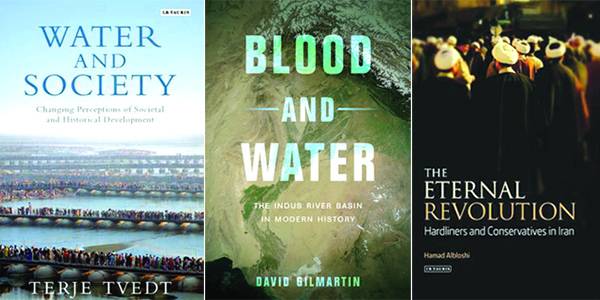

Ballots, Bullets, and Bargains: American Foreign Policy and Presidential Elections
Michael H. Armacost
Columbia University Press (2015)
Rs4,351
Drawing on twenty-four years of experience in government, Michael H. Armacost explores how the contours of the U.S. presidential election system influence the content and conduct of American foreign policy. He examines how the nomination battle impels candidates to express deference to the foreign policy DNA of their party and may force an incumbent to make wholesale policy adjustments to fend off an intra-party challenge for the nomination. He describes the way reelection campaigns can prod a chief executive to fix long-neglected problems, kick intractable policy dilemmas down the road, settle for modest course corrections, or scapegoat others for policies gone awry.
Armacost begins his book with the quest for the presidential nomination and then moves through the general election campaign, the ten-week transition period between Election Day and Inauguration Day, and the early months of a new administration. He notes that campaigns rarely illuminate the tough foreign policy choices that the leader of the nation must make, and he offers rare insight into the challenge of aligning the roles of an outgoing incumbent (who performs official duties despite ebbing power) and the incoming successor (who has no official role but possesses a fresh political mandate). He pays particular attention to the pressure for new presidents to act boldly abroad in the early months of his tenure, even before a national security team is in place, decision-making procedures are set, or policy priorities are firmly established. He concludes with an appraisal of the virtues and liabilities of the system, including suggestions for modestly adjusting some of its features while preserving its distinct character.
Michael H. Armacost is the Shorenstein Distinguished Fellow at Stanford University’s Walter H. Shorenstein Asia-Pacific Research Center. In addition to having held senior positions at the Defense Department and on the National Security Council staff, he served as undersecretary of state for political affairs and as U.S. ambassador to the Philippines and Japan. He was president of the Brookings Institution from 1995 to 2002. He has received the President’s Distinguished Service Award, the Defense Department’s Distinguished Civilian Service Award, the Secretary of State’s Distinguished Service Award, and the Japanese government’s Grand Cordon of the Order of the Rising Sun. He is the author of Friends or Rivals? The Insider’s Account of U.S.–Japan Relations and The Politics of Weapons Innovation: The Thor-Jupiter Controversy. He also coedited, with Daniel Okimoto, The Future of America’s Alliances in Northeast Asia.
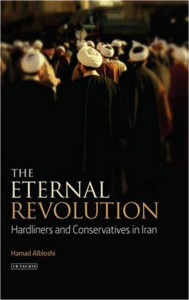
The Eternal Revolution: Hardliners and Conservatives in Iran
Hamad Albloshi
I.B.Tauris & Co Ltd (2016)
Rs9,537.00
More than three decades have passed since the establishment of the Islamic Republic of Iran in 1979. In that time, theories of modern revolution would suggest a retreat from ideological goals, heralding a phase of institutional development. However, Hamad Albloshi argues that Iran is unique: the current rhetoric of conservative Iranian leaders implies the regime has not left its revolutionary stage. Through an examination of the hardline conservative ideology in Iran—personified by the former president Mahmoud Ahmadinejad—this book explores how the usual development seen in revolutions from radical discourse to pragmatic rhetoric has not been the case in Iran. Albloshi explores the evolution of the hardline conservatives and their main ideas about the nature of the Iranian regime, their position toward other groups within the system and their approach to the international community. By doing so, he sheds new light on the group’s position in the country and the ideological roots of major shifts that occurred in Iran’s internal and external policies in the period between 2005 and 2013.
Hamad Albloshi is Assistant Professor in the Political Science Department at Kuwait University. He is an expert in Iranian history and politics. He holds a PhD in International Relations from the Fletcher School of Law and Diplomacy at Tufts University.
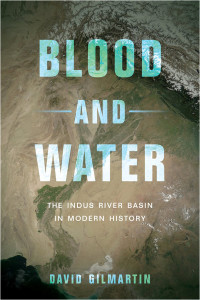
Blood and Water: The Indus River Basin in Modern History
David Gilmartin
University of California Press (2015)
Rs9,324
The Indus basin was once an arid pastoral watershed, but by the second half of the twentieth century, it had become one of the world’s most heavily irrigated and populated river basins. Launched under British colonial rule in the nineteenth century, this irrigation project spurred political, social, and environmental transformations that continued after the 1947 creation of the new states of India and Pakistan. In this first large-scale environmental history of the region, David Gilmartin focuses on the changes that occurred in the basin as a result of the implementation of the world’s largest modern integrated irrigation system. This masterful work of scholarship explores how environmental transformation is tied to the creation of communities and nations, focusing on the intersection of politics, statecraft, and the environment.
David Gilmartin is Distinguished Professor of History at North Carolina State University and the author of Empire and Islam: Punjab and the Making of Pakistan.
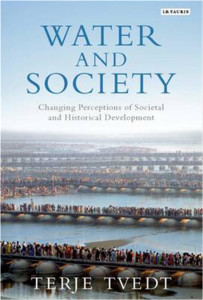
Water and Society: Changing Perceptions of Societal and Historical Development
Terje Tvedt
I.B.Tauris & Co Ltd (2015)
Rs10,195
Despite the central importance that water has held for civilizations both ancient and modern, its social significance has made surprisingly little impact on our contemporary understanding of human history and development. Dominant interpretations of the relationship between society and nature have remained water blind. In Water and Society historian and leading water expert Terje Tvedt argues for a change that acknowledges the significant role played by water in societal development. Reflecting his expertise as a geographer, historian and a political scientist, and drawing on his wide experience of water issues around the world, Terje Tvedt s Water and Society provides a long overdue reappraisal of the relationship between water and society, one that gives water its rightful place as central to any true understanding of human history and development.”
Terje Tvedt is professor at the Department of Geography, University of Bergen, and professor in Global History at the University of Oslo. Tvedt is series editor as well as co-editor for all the nine volumes in the series A History of Water. He has published a number of books and articles about the history of the Nile Basin, especially focusing on the modern period from the British Nile Empire until today (see for example The River Nile in the Age of the British and The Nile. The River of History).
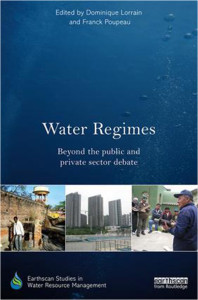
Water Regimes: Beyond the public and private sector debate
Eds. Dominique Lorrain, Franck Poupeau
Routledge (2016)
Rs13,977
In recent years the water sector has undergone profound institutional, economic and political transformations. Some countries have encouraged privatization of water services, but in many cases this has provoked adverse reaction to such a neoliberal and market-based approach to this common shared but essential resource.
This book goes beyond the ideology of the public versus private water regime debate, by focusing on the results of these types of initiatives to provide better water services, particularly in urban settings. It provides numerous examples of alternative models, to show who is responsible for implementing such systems and what are their social, institutional and technical-scientific characteristics. Policies are analysed in terms of their implications for employees and residents.
The book presents a new combinatory approach of water regimes, based on several international case studies (Argentina, Bolivia, China, France, Germany, India, South Africa and the USA, plus a comparison of three cities in Africa) presenting specific challenges for water models. These case studies demonstrate the successes and problems of a range of private sector involvements in the provision of water services, and provide examples of how small-scale systems can compare with larger-scale more technical systems.
Dominique Lorrain is Director of Research (emeritus) at CNRS, Latts, Ecole des Ponts ParisTech, Paris, France.
Franck Poupeau is a Director of Research at CNRS and Director of the International Joint Center iGLOBES, based at the University of Arizona, USA.

